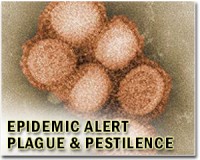| . |  |
. |
Geneva (AFP) Aug 10, 2010 The World Health Organisation on Tuesday declared the swine flu pandemic over, more than a year after the new virus spread around the world, sparking panic and killing thousands before fizzling out. "The world is no longer in phase six of the pandemic alert. We are now moving into the post-pandemic period," WHO Director General Margaret Chan said in a telephone news conference. "The new H1N1 virus has largely run its course," she added, saying an international public health emergency "no longer applies." The top phase of the WHO's six tier pandemic alert scale corresponds to a pandemic, or global spread of a disease. The step followed advice given earlier Tuesday by the WHO's advisory emergency committee of 15 external scientists headed by Australian infectious diseases expert John Mackenzie, which heard evidence from representatives of Australia, Argentina, New Zealand and South Africa. The WHO's top flu official, Keiji Fukuda, told journalists that the A(H1N1) influenza virus was no longer considered to be capable of causing another pandemic, even if more severe outbreaks might occur in some countries. Swine flu has killed more than 18,449 people and affected some 214 countries and territories since it was uncovered in Mexico and the United States in April 2009, according to WHO data. The new virus spread swiftly worldwide despite drastic measures including a week long shutdown in Mexico, prompting the UN health agency to scale up its alerts and declare a pandemic on June 11, 2009, banishing kisses and frowning on handshakes. Fears about the impact of swine flu on unprotected populations and a harmful mutation sparked a rush for hundreds of millions of dollars worth of specially-developed vaccines and a flurry of public health precautions. However, those concerns dwindled in late 2009 to be replaced by recriminations in Western nations about the cost of unused vaccines and what some European critics regarded as an unjustified scare. Fukuda said Tuesday that said about 300 million people had been vaccinated worldwide against A(H1N1). After petering out in Europe and the United States before their winter flu season was over, in recent months swine flu has affected parts of South Asia and "limited areas" of tropical South and Central America, as well as Africa for their second season. But unlike 2009, when A(H1N1) ousted most other types of flu viruses around the world, known seasonal viruses now are prevalent and even dominant in countries such as South Africa. Chan acknowledged that swine flu was no longer "crowding out" other virus types and was behaving like seasonal flu, while populations appeared to have built up a degree of immunity thanks to exposure last year or vaccination. "Continued vigilance is extremely important," Chan cautioned, adding that "good luck" had also played its part in the virus's decline. The monthly growth in the global pandemic toll has been below 200 for the past three months, compared to 2,000 to 4,000 at the beginning of the year. Outbreaks have become "less intense" and smaller, Fukuda said. However, younger people and vulnerable groups such as pregnant women still stood greater risk of more severe illness, he cautioned. The WHO has responded to criticism of the international alert by setting up a committee of external experts to review the handling of the pandemic, which is due to give its findings by the beginning of next year. But some lessons have been learnt already, Chan and Fukuda said, including the lack of drugs for poor nations in an emergency, the need for better communications and to revamp a pandemic alert system designed for a more severe virus. Vaccines for regular seasonal influenza viruses now incorporate protection against A(H1N1) swine flu, and the WHO insists on the merits of flu jabs. The world remains on phase three of the flu alert scale for the less infectious but deadlier H5N1 bird flu.
Share This Article With Planet Earth
Related Links Epidemics on Earth - Bird Flu, HIV/AIDS, Ebola
 Disease stalks survivors of Pakistan floods
Disease stalks survivors of Pakistan floodsPeshawar, Pakistan (AFP) Aug 2, 2010 Fears grew Monday about outbreaks of disease among 1.5 million people affected by Pakistan's worst floods in 80 years after monsoon rains killed more than 1,200 people across the northwest. Unprecedented rains triggered floods and landslides, sweeping away thousands of homes and devastating farmland in one of Pakistan's most impoverished regions, already hard hit by years of Taliban and Al-Q ... read more |
|
| The content herein, unless otherwise known to be public domain, are Copyright 1995-2010 - SpaceDaily. AFP and UPI Wire Stories are copyright Agence France-Presse and United Press International. ESA Portal Reports are copyright European Space Agency. All NASA sourced material is public domain. Additional copyrights may apply in whole or part to other bona fide parties. Advertising does not imply endorsement,agreement or approval of any opinions, statements or information provided by SpaceDaily on any Web page published or hosted by SpaceDaily. Privacy Statement |